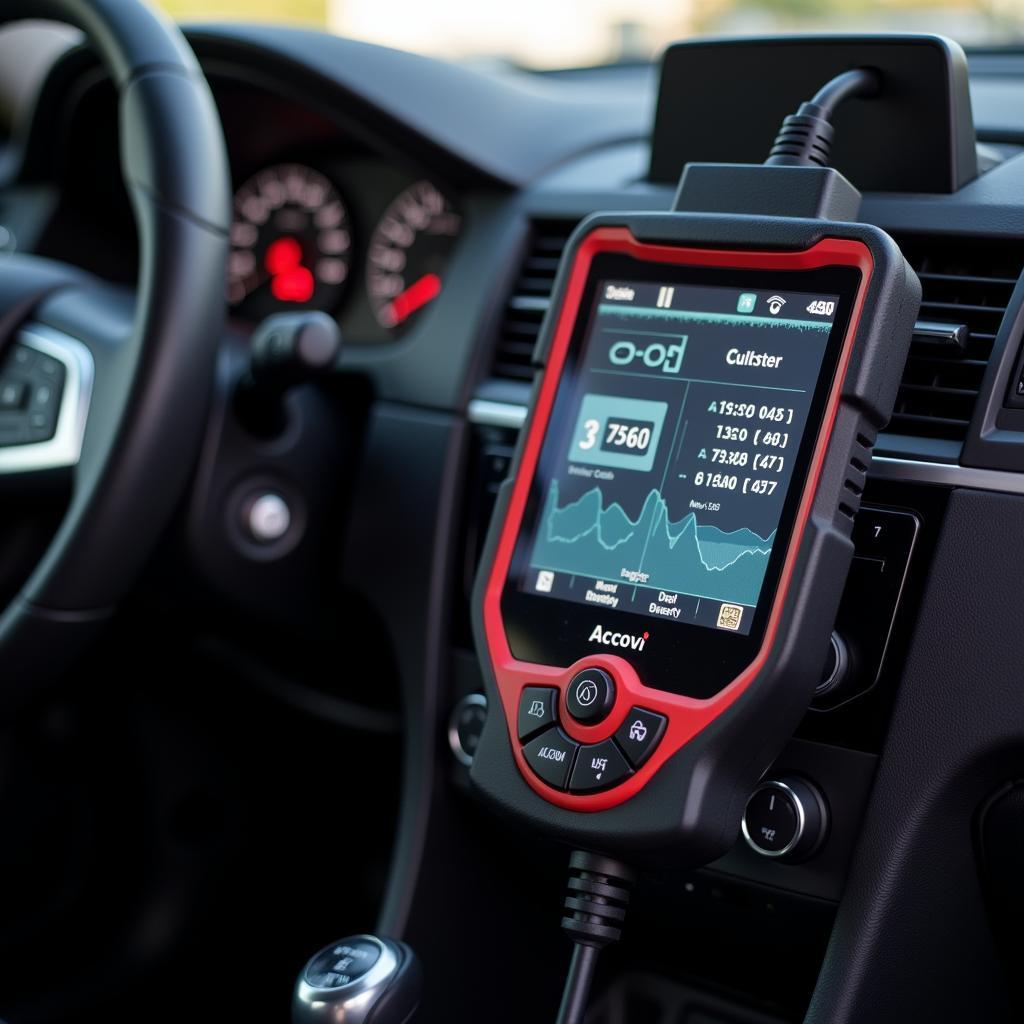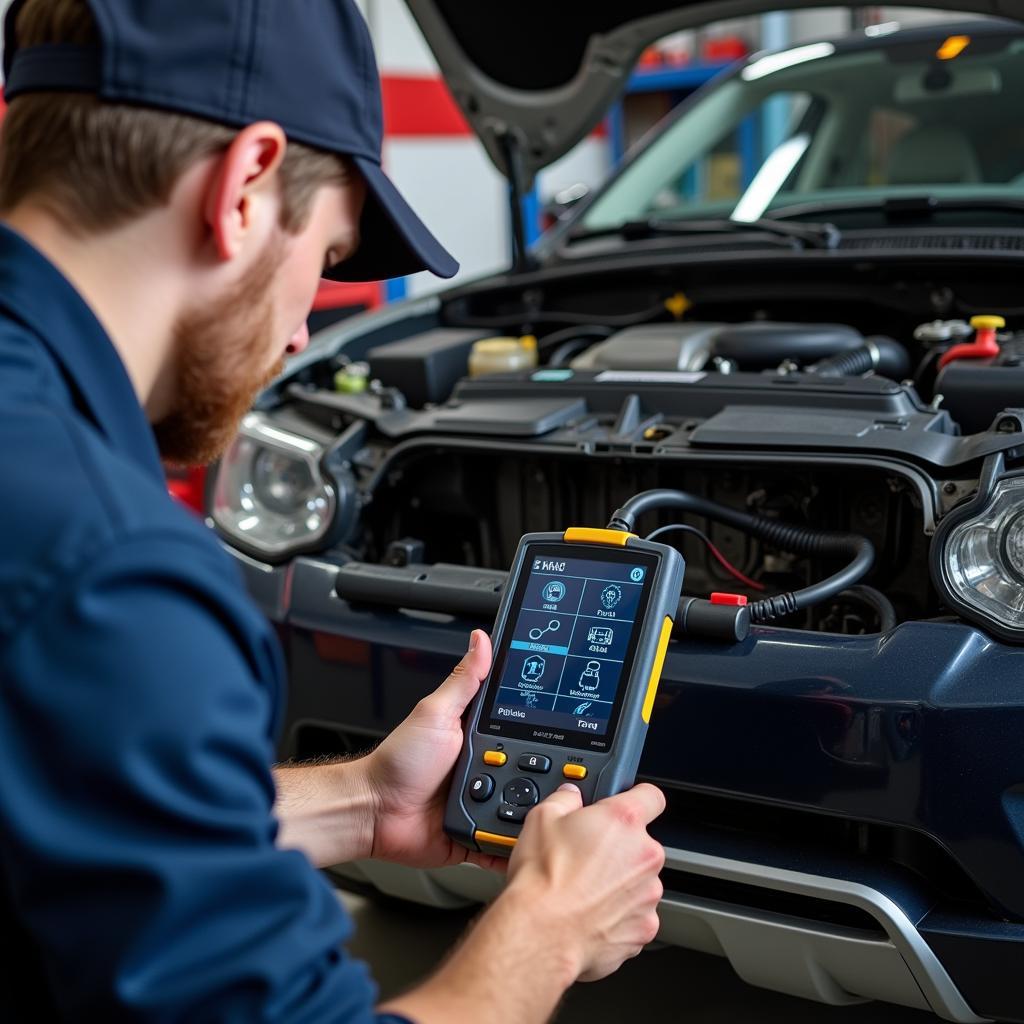A Car Analyzer Diagnostic tool is an essential piece of equipment for any mechanic or car enthusiast. It allows you to connect to your car’s computer system and read diagnostic trouble codes (DTCs), which can help you identify and troubleshoot problems with your vehicle.
Understanding the Importance of Car Analyzer Diagnostics
 Car analyzer diagnostic tool connected to vehicle
Car analyzer diagnostic tool connected to vehicle
Car analyzer diagnostics have revolutionized the way we diagnose and repair vehicles. Gone are the days of relying solely on mechanical expertise and intuition. Today, these sophisticated tools provide mechanics and car owners with an unprecedented level of insight into the inner workings of their vehicles.
By interpreting the data provided by a car analyzer diagnostic tool, mechanics can quickly and accurately:
- Identify the root cause of a problem: Instead of relying on trial and error, mechanics can pinpoint the exact component or system that is malfunctioning.
- Save time and money on repairs: By identifying the problem quickly, unnecessary repairs and part replacements can be avoided.
- Improve the accuracy of repairs: With detailed information about the vehicle’s systems, mechanics can make more informed decisions about the best course of action.
- Enhance vehicle performance and longevity: Regular use of car analyzer diagnostics can help identify minor issues before they escalate into major problems, extending the life of the vehicle.
Types of Car Analyzer Diagnostic Tools
There are a variety of car analyzer diagnostic tools available on the market, ranging from basic code readers to advanced professional-grade scanners.
- Code Readers: These are the most basic type of diagnostic tool and are designed to read and clear DTCs. They are relatively inexpensive and easy to use, making them a popular choice for DIY car owners.
- OBD-II Scanners: These tools offer more advanced features than code readers, such as the ability to view live data streams from the vehicle’s sensors. They are also able to access manufacturer-specific codes, providing more detailed information about the vehicle’s systems.
- Professional-Grade Scanners: These are the most sophisticated type of diagnostic tool and are used by professional mechanics. They offer a wide range of features, including the ability to perform advanced diagnostics, reprogram modules, and access all vehicle systems.
 Mechanic using professional-grade car analyzer diagnostic tool
Mechanic using professional-grade car analyzer diagnostic tool
How to Choose the Right Car Analyzer Diagnostic Tool
Choosing the right car analyzer diagnostic tool depends on your individual needs and budget.
- DIY Car Owners: For basic diagnostics and code reading, a code reader or an OBD-II scanner may be sufficient. Consider features such as ease of use, code definitions, and live data streaming capabilities.
- Professional Mechanics: For advanced diagnostics, module programming, and access to all vehicle systems, a professional-grade scanner is essential. Look for tools with a wide range of features, manufacturer-specific coverage, and regular software updates.
Beyond Diagnostics: Expanding the Scope of Car Analyzers
While car analyzer diagnostics are primarily used for troubleshooting, their capabilities extend far beyond simply identifying problems. Advanced tools can be used to:
- Monitor vehicle performance: By analyzing live data streams, mechanics can monitor critical engine parameters such as fuel pressure, air intake, and ignition timing to optimize performance.
- Customize vehicle settings: Some tools allow you to customize vehicle settings such as door locks, lighting, and even engine mapping for a personalized driving experience.
- Program new keys and modules: When replacing faulty modules or adding new keys, professional-grade scanners can be used to program them to the vehicle’s immobilizer system.
Common Car Analyzer Diagnostic Terms
Understanding the terminology used in car analyzer diagnostics is essential for effective troubleshooting.
- Diagnostic Trouble Code (DTC): A standardized code that identifies a specific problem with the vehicle.
- OBD-II: On-Board Diagnostics, version II, is a standardized system that allows external devices to access the vehicle’s diagnostic system.
- CAN Bus: Controller Area Network is a communication protocol used by the vehicle’s electronic control units (ECUs) to exchange data.
- Live Data Stream: Real-time data from the vehicle’s sensors, providing insights into the current operating conditions.
- Freeze Frame Data: A snapshot of the vehicle’s sensor readings at the time a DTC was stored.
The Future of Car Analyzer Diagnostics
The automotive industry is constantly evolving, and with it, the technology behind car analyzer diagnostics continues to advance. We can expect to see:
- Increased use of wireless technology: Wireless diagnostic tools are becoming increasingly popular, offering greater flexibility and convenience.
- Integration with cloud-based platforms: Cloud-based platforms allow for data storage, remote diagnostics, and access to technical information and support.
- Advanced data analytics: Artificial intelligence (AI) and machine learning are being integrated into diagnostic tools to provide predictive maintenance suggestions and optimize vehicle performance.
Conclusion
Car analyzer diagnostics have become an indispensable tool for anyone involved in vehicle maintenance and repair. Whether you are a DIY car owner or a professional mechanic, understanding the capabilities of these tools and how to use them effectively can save you time, money, and frustration. As technology continues to advance, we can expect car analyzer diagnostics to play an even more critical role in the future of automotive repair.
FAQs
What is the difference between a code reader and an OBD-II scanner?
A code reader can only read and clear DTCs, while an OBD-II scanner offers additional features such as live data streaming and access to manufacturer-specific codes.
Do I need a professional-grade scanner?
If you are a DIY car owner, a code reader or an OBD-II scanner may be sufficient. Professional mechanics require professional-grade scanners for advanced diagnostics and module programming.
How often should I use a car analyzer diagnostic tool?
It is a good practice to use a car analyzer diagnostic tool to check for DTCs at least once a year or whenever you experience any problems with your vehicle.
Can I use a car analyzer diagnostic tool on any vehicle?
Most car analyzer diagnostic tools are compatible with vehicles manufactured after 1996 that are equipped with an OBD-II port.
Where can I get more information about car analyzer diagnostics?
For more information about car analyzer diagnostics, you can visit websites like DiagFixPro, consult your vehicle’s owner’s manual, or contact a qualified mechanic.
Looking for a specific car diagnostic tool? Check out our reviews of the mechanics stethoscope car engine block analyzer diagnostic hearing tester tool and explore options to hire car diagnostic tool.

Leave a Reply